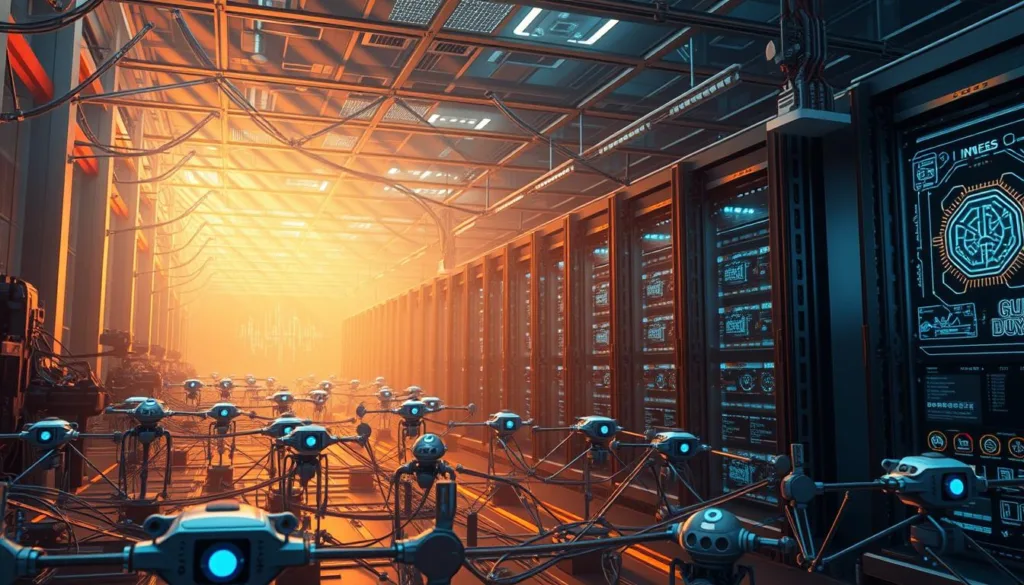What is the role of orchestration in agentic AI systems Artificial intelligence has changed how we solve complex problems. Agentic AI systems lead this change. They use orchestration in AI to work well, making it key to their design.
Orchestration in AI helps these systems coordinate. This lets them decide and act on their own.

Agentic AI systems work alone, using AI to handle complex situations. Orchestration makes sure all parts work together smoothly. This lets the system reach its goals.
Understanding orchestration in AI helps us use agentic AI systems fully. This unlocks the power of AI for innovation.
Introduction to Agentic AI Systems
What is the role of orchestration in agentic AI systems Exploring agentic AI systems shows how crucial orchestration in AI is. It helps us see how AI changes industries and solves complex problems.
Key Takeaways
- Agentic AI systems rely on orchestration in AI to function efficiently
- Orchestration in AI enables the coordination of multiple components
- Artificial intelligence is a crucial component of agentic AI systems
- Orchestration in AI enables agentic AI systems to make decisions and take actions autonomously
- Understanding the importance of orchestration in AI is key to unlocking the full potential of agentic AI systems
Understanding the Foundations of Agentic AI Systems
What is the role of orchestration in agentic AI systems Agentic AI systems are a type of intelligent systems that can see their surroundings, think about their actions, and do tasks. They have gotten smarter over time thanks to machine learning. To get the basics of agentic AI systems, we need to look at their main parts and how they’ve changed.
The growth of agentic AI systems is linked to the advancement of AI systems in general. As machine learning algorithms got better, AI agents could make decisions and act on their own more. This has made intelligent systems more complex and advanced.
- Perception: The ability to gather and process information from the environment
- Reasoning: The ability to draw conclusions and make decisions based on perceived information
- Action: The ability to execute tasks and interact with the environment
These parts work together to help agentic AI systems work well and efficiently.
The Core Principles of AI Orchestration
AI orchestration is key in agentic AI systems. It automates tasks and brings together different technologies. It makes AI agents work together smoothly towards shared goals. This is done through automation technologies that make tasks run smoothly.
Technology integration is also vital in AI orchestration. It lets different AI agents and systems work together for complex goals. This makes AI systems more advanced, able to do many tasks. AI orchestration also makes AI systems flexible and scalable, adapting to new needs. What is the role of orchestration in agentic AI systems
Some main benefits of AI orchestration include:
- Improved efficiency and productivity
- Enhanced flexibility and scalability
- Increased accuracy and reliability
What is the role of orchestration in agentic AI systems Research on AI orchestration and automation shows they can change how we tackle complex tasks. By using AI orchestration and automation, companies can become more efficient and productive. They can also be more accurate and reliable. As AI technology keeps improving, AI orchestration will become even more important. It will help create more advanced and effective AI systems.
What is the Role of Orchestration in Agentic AI Systems?
What is the role of orchestration in agentic AI systems Orchestration is key in agentic AI systems. It helps coordination in AI among different agents. This ensures they work well together to reach their goals. It does this by managing resources well to boost system performance.
Orchestration also helps in creating decision-making frameworks for AI agents. These frameworks let AI agents make smart choices. They analyze data, look at options, and pick the best action. This way, AI systems can work better and get better results.
Effective Orchestration Mechanisms
- Enable coordination in AI among agents
- Facilitate resource management and allocation
- Support the development of decision-making frameworks
What is the role of orchestration in agentic AI systems With good orchestration, AI systems can do better. They become more efficient and make smarter decisions. This leads to better results and more value.
Components of AI Orchestration Architecture
What is the role of orchestration in agentic AI systems The AI architecture is a complex system that needs careful planning and design. At its core are the orchestration layers, key to integrating various components. These layers manage data and tasks flow, ensuring the system works well.
System integration is crucial, and the orchestration layers make it happen. They use standardized interfaces and protocols for data and command exchange. This creates a system that can make decisions and act on its own.
Key Components of Orchestration Layers
- Management layer: oversees the system’s overall operation
- Control layer: manages data and task flow between components
- Execution layer: carries out tasks and commands from the control layer
What is the role of orchestration in agentic AI systems Effective system integration is key to AI orchestration success. It leads to a cohesive and efficient system. By understanding AI orchestration architecture, developers can create highly integrated systems.

Benefits of Orchestrated AI Systems
What is the role of orchestration in agentic AI systems Orchestrated AI systems bring many benefits. They make things more efficient and help make better decisions. These systems can change as needed, learn from past experiences, and get better with time.
The benefits of AI grow even more in orchestrated systems. They help companies make their processes smoother, cut costs, and work better overall. For example, a company can use these systems to automate tasks. This frees up time for more important projects.
Some main benefits of orchestrated AI systems are:
- Improved accuracy and reliability
- Enhanced scalability and flexibility
- Increased efficiency and productivity
By using orchestrated systems, companies can fully use AI’s power. This leads to better customer service and more competition in the market.
Challenges in Implementing AI Orchestration
What is the role of orchestration in agentic AI systems AI orchestration is growing, but it faces many hurdles. One big issue is technical barriers. These barriers make it hard to connect AI with current systems. This can lead to higher costs, more complexity, and less efficiency, hurting the AI’s performance.
Another big challenge is scalability. As AI gets more complex, it needs more resources to work well. But scaling AI is tough because different parts don’t work together well. This can cause slower performance, longer wait times, and less reliability.

What is the role of orchestration in agentic AI systems To beat these challenges, we need to tackle challenges in AI directly. We can do this by investing in research, pushing for standardization, and creating more efficient AI designs. This way, companies can fully use AI orchestration and get its benefits.
- Developing more efficient and scalable AI architectures
- Investing in research and development
- Promoting standardization and interoperability
By facing these challenges, companies can make AI orchestration work well. It’s important to remember that solving these problems takes time and effort. But the rewards of AI orchestration make it worth it.
Real-world Applications of AI Orchestration
What is the role of orchestration in agentic AI systems AI orchestration is becoming more common in many industries. It helps make things more efficient, cut costs, and improve how we interact with customers. Enterprise use cases include automating tasks, better managing resources, and making smarter decisions. For instance, in healthcare, AI helps make clinical work smoother and better for patients.
Here are some examples of industry-specific uses: What is the role of orchestration in agentic AI systems
- Finance: AI helps spot fraud and make better investment choices.
- Manufacturing: It optimizes production, predicts when things need fixing, and improves supply chains.
- Transportation: AI makes routes better, saves fuel, and boosts safety.
What is the role of orchestration in agentic AI systems These examples show how AI orchestration can change industries. AI applications are being looked into in many fields. As AI gets better, we’ll see even more creative ways it’s used in business and specific industries.
Best Practices for AI Orchestration Design
What is the role of orchestration in agentic AI systems When designing AI orchestration, there are key best practices to remember. These help make your AI system efficient, effective, and able to grow. One crucial practice is to design with flexibility in mind. This means your AI system should adjust to new situations and needs.
Another important practice is to focus on security in your AI design. This includes strong security steps to keep your system safe from threats. It’s also vital to ensure all parts of your AI system work well together.
What is the role of orchestration in agentic AI systems :Some other best practices for AI orchestration design include:
- Using agile methodologies to facilitate iterative development and improvement
- Engaging stakeholders throughout the design process to ensure that their needs are met
- Continuously monitoring and evaluating the performance of your AI system
By following these best practices, you can build an AI orchestration system that works well. Always keep best practices in mind and remember the role of orchestration in your system’s success.
Future Trends in AI System Orchestration
What is the role of orchestration in agentic AI systems Looking ahead, emerging technologies will greatly influence AI system orchestration. Advances in machine learning and cloud computing will lead to smarter, more independent AI systems. The future holds a lot of promise for new technologies to make AI orchestration more efficient and effective.
What is the role of orchestration in agentic AI systems Some exciting future trends include the rise of natural language processing and computer vision in AI. These technologies will help AI systems understand and interact with their surroundings better. This will make AI orchestration smoother and more efficient. The Internet of Things (IoT) will also become more important, requiring AI systems to be more flexible and adaptable.
Here are some key areas to watch in the future of AI system orchestration:
- Increased use of AI developments like machine learning and deep learning
- Greater emphasis on emerging technologies like IoT and edge computing
- More focus on future trends like autonomous systems and explainable AI
Conclusion: The Future of Orchestrated AI Systems
What is the role of orchestration in agentic AI systems :The role of orchestration in AI systems is set to grow. These advanced AI agents will need better coordination to work well in complex settings. This will lead to more reliable and adaptable AI solutions that change industries and our daily lives.
Orchestrated AI systems have the power to manage resources better and make smarter decisions. As we invest more in this area, AI orchestration will become key in the next AI era. It will change how we solve problems, automate tasks, and innovate in many fields.
FAQ
What is the role of orchestration in agentic AI systems?
Orchestration is key in agentic AI systems. It helps AI agents work together smoothly. This makes them more efficient and able to make decisions on their own.
How do agentic AI systems differ from traditional AI?
Agentic AI systems are more advanced than traditional AI. They can see their surroundings, think about their actions, and do tasks by themselves. This lets them adapt and learn from their experiences.
What are the core principles of AI orchestration?
AI orchestration is based on automation, integration, and coordination. It automates tasks and connects different technologies. It also helps AI agents work together towards common goals.
How does orchestration support decision-making in agentic AI systems?
Orchestration helps AI systems make better decisions. It coordinates information and actions among agents. This lets them evaluate options, consider risks, and choose the best action.
What are the key components of an AI orchestration architecture?
An AI orchestration architecture includes layers, integration points, and interfaces. These parts work together to manage resources, exchange data, and make decisions efficiently.
What are the benefits of using orchestrated AI systems?
Orchestrated AI systems are more efficient and make better decisions. They adapt to changes and learn from their experiences. This makes them reliable for many applications.
What are the challenges in implementing AI orchestration?
Implementing AI orchestration faces technical barriers, scalability issues, and security concerns. Integrating technologies and ensuring coordination and security is complex. It requires ongoing research and development.
What are some real-world applications of AI orchestration?
AI orchestration is used in healthcare, finance, and manufacturing. It improves efficiency, customer experience, and resource allocation. It automates processes and adapts to market changes.
What are the best practices for designing effective AI orchestration systems?
Designing AI orchestration systems should focus on flexibility, scalability, and security. Continuous monitoring and evaluation are important. Using agile methodologies and engaging stakeholders ensures the system meets evolving needs.
What are the future trends in AI system orchestration?
Future trends include integrating advanced technologies like machine learning and IoT. These advancements will make AI systems more sophisticated and autonomous. Ongoing research is crucial for their evolution.

